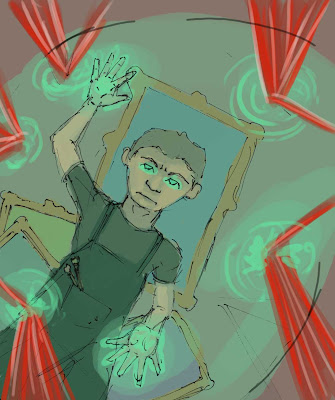As a junior in high school, I knew I wanted to be an artist. I gathered my random drawings and doodles and applied to Art Center College of Design. I received a four-semester full tuition at their illustration department. During the rest of my high school years, my mother was diagnosed with cancer, my father was laid off from his office job due to work politics, and my sister developed manic depression. So when I finished senior year and couldn’t afford to continue at Art Center, I took on two jobs and schooled myself through city college while helping to pay the bills at home. The first semester of junior college, I took painting, acting, and dance classes. To this day, that was one of the most memorable years. As I immersed myself at my jobs and academics, I slowly lost track of my direction. My parents, though well-meaning in their quest for our family’s survival, told me to “stop dreaming,” that “art was just a hobby,” and “it won’t pay the bills.” They told me that even if an artist were even able to “make it,” it would be because they started out already really, really good, that they had talent and had wanted it since at a very young age. Since I didn’t express my interest in art until high school, I believed them: I believed that whatever passion I had for art, was not enough to begin with. I didn’t show an overwhelming promise. I didn’t start early enough, I thought. They took me aside and looked at me with pleading eyes, “You don’t really want to go into art now, do you?” I was confused. I nodded. I would forever regret my own collusion and betrayal.
I doubled
my focus on work and academics and found that I loved Literature. In my last
year of English class at city college, my teacher Ms. Allison Murray assigned
the class to write personal essays based on the UC school application themes.
It was a required final essay to pass the class. I turned mine in, not
expecting much. “You should actually apply to the UC with this essay, “ she
confronted me in the hallway. I thought of my entire extended family, most of
who never finished beyond junior high. I thought of my mother who finished her
masters in engineering, whose degree wasn’t recognized in the US, who worked at
Gatorade bottling juice and vacuumed offices as a janitor, and my Dad who would
glue little tabs unto A frames so when people had displays at stores, these A
frames would stand properly. At that time, I worked two jobs and didn’t even
pass the ESL test even though I grew up in the US, there was no way a four-year
college was possible for me. For the next two weeks, Ms. Murray pestered me,
emailed me, called me, “Did you turn in your essay and application to the UC?”
The answer was always the same, “I’ll think about it.” Seeing my mother worried
about bills at night by the kitchen light, my father pulling double work
shifts, and my sister struggling through her own school, I didn’t think I had a
right to apply.
I prepared
myself to disappoint Ms.Murray by telling her I wasn’t going to apply after
all. After class, I took my time to leave, hoping to talk to her alone. She
said goodbye to the students leaving and our gaze met, her eyes narrowed, her
voice quieted and slowed with intensity she said, “You.Can.Do.This.”
I thought
about why it was I was drawn to art and literature in the first place and even
though it was hard to pursue, why I wanted to continue: I wanted to find the
key to myself and I wanted to express myself through art and writing. I also
wanted to encourage others to climb their own mountains and grab a hold of
their own individual keys. I turned in my essay to the UC system. In the
spring, I was accepted to all of the five schools I applied for: Berkeley,
UCLA, Irvine, Santa Cruz, and San Diego.
When
someone believes in you, it is the greatest selfless love that one can give.
Has someone
believed in you and made a lasting impact on your life? Be sure to thank them
and let them know how you’re doing!
I have many
people to thank in my creative and self-discovery journey (Rick, Martha, Carlos
to name a few) and they all deserve their own post and recognition. So please stayed tuned for Part II of
“When Someone Believes in You . . . “


